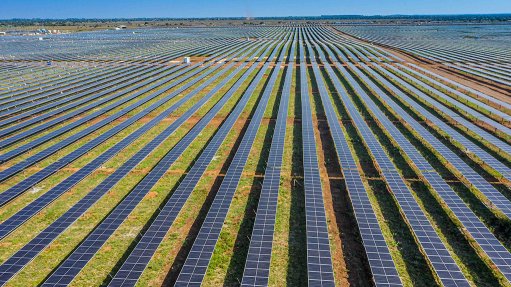Local governments not using core financial systems, says Treasury
National Treasury has highlighted that the credibility of the information contained in the Municipal Standard Chart of Account (mSCOA) data strings is a concern, and a core problem includes the incorrect use of the mSCOA and municipal accounting practices by municipalities.
"A large number of municipalities are not budgeting, transacting and reporting directly in and from their core financial systems. They prepare their budgets and reports on excel spreadsheet and then import the excel spreadsheets into the system. Often, this manipulation of data lead to unauthorised, irregular, fruitless and wasteful expenditure, and fraud and corruption, as the controls that are built into the core financial systems are not triggered and transactions go through that should not," Treasury said in its 2022/23 first-quarter report on local government revenue and expenditure for July 1 to September 30.
Municipalities are also not locking their adopted budgets or their financial systems at month-end to ensure prudent financial management, the report added.
"To enforce municipalities to lock their budgets and close their financial system at month-end in 2022/23, the Local Government Portal will be locked at the end of each quarter. System vendors were also requested to build this functionality into their municipal financial systems," Treasury highlighted.
Meanwhile, a total of R2.4-billion was allocated to capacity building and other grants, including the unallocated Municipal Disaster Grant and the Municipal Emergency Housing Grant.
"These grants are intended to assist municipalities in the development of their management, planning, technical, budgeting and financial management capabilities in the 2022/23 financial year," Treasury said.
The Municipal Disaster Grant assists municipalities in alleviating the impact of a disaster, such as the floods that occurred in KwaZulu-Natal and the Eastern Cape in April this year, which resulted in damage to infrastructure, housing and displacement of people, as well as loss of lives. Funding has again in 2022/23 been allocated to affected municipalities to continue with efforts to alleviate the impact of the floods, it added.
INFRASTRUCTURE EXPENDITURE
National transfers for infrastructure, excluding indirect or in-kind allocations to transferring officers executing specific projects on behalf of municipalities in the municipal area, amounts to R38.2-billion in the first quarter of the 2022/23 financial year.
"The highest performing direct infrastructure grant to municipalities during the first quarter was the Neighbourhood Development Partnership Grant which reported performance of 17.7%, followed by the Municipal Infrastructure Grant at 14.2%, then the Integrated Urban Development Grant, which reported performance of 12.7%.
"The Rural Roads Assets Management Systems Grant reported performance of 10.8% and the Informal Settlements Upgrading Partnership Grant reported performance of 10.4%, while all other infrastructure grants reported expenditure of less than 10% of their allocations," Treasury said in the report.
However, the lowest spending grant under the infrastructure grants during the first quarter in the period was the Integrated National Electrification Programme grant, which reported no expenditure, followed by the Public Transport Network Grant with expenditure of R359.5-million, or 6%, from the R6-billion allocation.
"The low levels of expenditure on the infrastructure grants are a concern, given the economic growth of the country depends on the much-needed infrastructure development, which also creates employment opportunities, given the high unemployment rate in the country," highlighted Treasury.
Further, indirect grants for infrastructure and capacity, allocated to municipalities increased to R8-billion in the 2022/23 financial year from R7-billion in the prior financial year, it said.
DEBT LEVELS
Aggregate municipal consumer debts amounted to R290-billion at the end of September, compared to R264.7-billion reported in the same period of the 2021/22 financial year. Government debt accounts for 8%, or R23.3-billion, at September 30, 2022, up from R19.6 billion reported in the first quarter of 2021/22.
The largest component of this debt relates to households which account for 70%, or R202.4-billion, compared to 70.5%, or R186.6-billion, in the comparable first quarter of the 2021/22 financial year.
"If consumer debt is limited to below 90 days, then the actual realistically collectable amount is estimated at R48.8-billion. However, this should not be interpreted that the National Treasury by implication suggests that the balance must be written-off by municipalities," the fiscal authority said.
Further, metropolitan municipalities are owed R147.5-billion in outstanding debt, up from R125.6-billion reported in the same period during the prior financial year. The largest contributors were the Cities of Johannesburg at R43.9-billion, Ekurhuleni at R27.8-billion, eThekwini at R21.7-billion and Tshwane at R17.7-billion.
Additionally, households in metropolitan areas are reported to account for R107.4-billion, or 72.8%, of outstanding debt to metros, followed by businesses, which account for R30.9-billion, or 20.9%. Debt owed by government agencies is at R8.4-billion of the total outstanding debt owed to metros, or 5.7%.
"Secondary cities are owed R55.8-billion in outstanding consumer debt, up from R50.6-billion reported in the first quarter of 2021/22 [financial year]. The majority of debt is owed by households, which amounts to R38-billion, or 68%, of the total outstanding debt," Treasury said in the report.
An analysis by customer group indicates an amount of R49.3-billion, or 88.4%, has been outstanding for more than 90 days, it added.
MUNICIPAL DEBT
Municipalities owed their creditors R86.2-billion as at September 30, and provinces with the highest percentage of outstanding municipal creditors in the category greater than 90 days include Free State at 90.2%, Mpumalanga at 89.9%, Northern Cape at 88.7% and North West at 77.2%.
"An increase in outstanding creditors could be an indication that municipalities are experiencing liquidity and cash challenges and, consequently, are delaying the settlement of outstanding debt owed," Treasury emphasised.
"The total balance on borrowing for all municipalities equates to R60.6-billion at the end of September 2022. This includes long-term loans of R45.6-billion, long-term marketable bonds of R8.4-billion, and other long-term non-marketable bonds of R1-billion. The balance represents other short- and long-term financing instruments."
REVENUE AND EXPENDITURE
Further, the local government revenue and expenditure report for the first quarter of the 2022/23 financial year showed that, on aggregate, municipalities spent 21%, or R117.1-billion, of the total adopted expenditure budget of R557.8-billion as at September 30.
In respect of revenue, aggregate billing and other revenue amounted to 27.4%, or R153-billion, of the total adopted revenue budget of R557.5-billion.
"Of the adopted operating expenditure budget amounting to R488-billion, R109.4-billion, or 22.4%, was spent by September 30, 2022.
"Municipalities have adopted the budget for salaries and wages expenditure at R146.6-billion, representing 30% of the operating budget of R488-billion for the 2022/23 municipal financial year. As at September 30, 2022, spending on salaries and wages is 6.9%, or R33.5-billion," Treasury showed in the report.
During the period under review, capital expenditure amounted to R7.7-billion, or 11.1%, of the adopted capital budget of R69.8-billion.
Aggregated year-to-date operating expenditure for metros amounts to R70.5-billion, or 24.1%, of their adopted budget expenditure of R292.1-billion. The aggregated adopted capital budget for metros in the 2022/23 financial year is R31.9-billion, of which 10.6%, or R3.4 billion, was spent as at September 30.
"When billed revenue is measured against their adopted budgets, the performance of metros reflects a marginal surplus on energy sources for the first quarter of the 2022/23 financial year. However, this does not take into account the collection rate," Treasury highlighted.
Billed water revenue was R12.8-billion against expenditure of R7.9-billion, and energy sources revenue billed was R27.62-billion against expenditure of R27.61-billion. The revenue billed for wastewater management was R3.9-billion against expenditure of R1.9-billion, and levies for waste management billed were R3.6-billion against expenditure of R2.2-billion.
Meanwhile, aggregated revenue for secondary cities is 22.1%, or R17.7-billion of their total adopted revenue budget of R79.9-billion for the 2022/23 financial year.
Further, the year-to-date aggregated operating expenditure level of the secondary cities is 19.9%, or R15.8-billion, of the total adopted operating budget of R79.5-billion for the 2022/23 financial year.
"The performance against the adopted budget for the four core services for the secondary cities for the first quarter 2022/23 also shows a deficit position against billed revenue without taking into account the collection rate. Water revenue billed was R2.3-billion against expenditure of R1.9-billion, and energy sources revenue billed was R7.2-billion against expenditure of R6.9-billion.
The revenue billed for wastewater management was R976-million against expenditure of R471-million, and levies for waste management billed were R999-million against expenditure of R497-million, Treasury said.
Meanwhile, capital spending levels are low at an average of 11%, or R936.2-million of the adopted capital budget of R8.5-billion.
Total investments made by municipalities at the end of September 2022 equate to R44.7-billion. Investments include bank deposits of R40.2-billion, guaranteed endowment policies, or sinking funds, of R3.9-billion, listed corporate bonds of R332-million and other smaller investments, Treasury said.
Comments
Press Office
Announcements
What's On
Subscribe to improve your user experience...
Option 1 (equivalent of R125 a month):
Receive a weekly copy of Creamer Media's Engineering News & Mining Weekly magazine
(print copy for those in South Africa and e-magazine for those outside of South Africa)
Receive daily email newsletters
Access to full search results
Access archive of magazine back copies
Access to Projects in Progress
Access to ONE Research Report of your choice in PDF format
Option 2 (equivalent of R375 a month):
All benefits from Option 1
PLUS
Access to Creamer Media's Research Channel Africa for ALL Research Reports, in PDF format, on various industrial and mining sectors
including Electricity; Water; Energy Transition; Hydrogen; Roads, Rail and Ports; Coal; Gold; Platinum; Battery Metals; etc.
Already a subscriber?
Forgotten your password?
Receive weekly copy of Creamer Media's Engineering News & Mining Weekly magazine (print copy for those in South Africa and e-magazine for those outside of South Africa)
➕
Recieve daily email newsletters
➕
Access to full search results
➕
Access archive of magazine back copies
➕
Access to Projects in Progress
➕
Access to ONE Research Report of your choice in PDF format
RESEARCH CHANNEL AFRICA
R4500 (equivalent of R375 a month)
SUBSCRIBEAll benefits from Option 1
➕
Access to Creamer Media's Research Channel Africa for ALL Research Reports on various industrial and mining sectors, in PDF format, including on:
Electricity
➕
Water
➕
Energy Transition
➕
Hydrogen
➕
Roads, Rail and Ports
➕
Coal
➕
Gold
➕
Platinum
➕
Battery Metals
➕
etc.
Receive all benefits from Option 1 or Option 2 delivered to numerous people at your company
➕
Multiple User names and Passwords for simultaneous log-ins
➕
Intranet integration access to all in your organisation


















